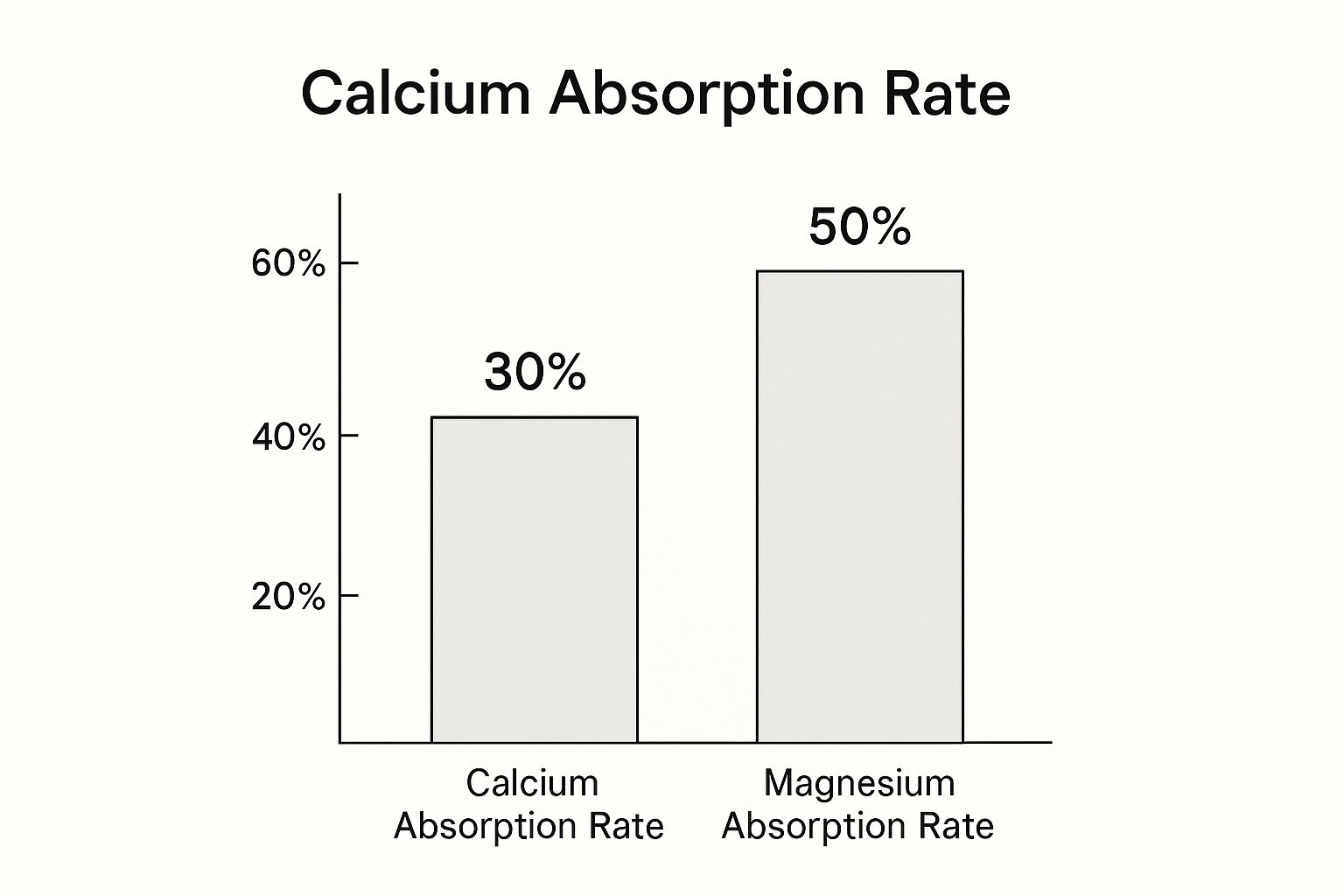
The Ultimate Guide to Calcium Magnesium Tablets
Share
A calcium magnesium tablet is a supplement that brings together two vital minerals, both working in sync to support everything from strong bones and muscle function to nerve signals and relaxation. As it turns out, this power duo is often far more effective when taken together than separately.
The Power Duo for Your Body's Framework

Think about building a solid structure. You can have all the best bricks (calcium) in the world, but without a skilled foreman (magnesium) to direct the work and make sure everything fits together perfectly, you won't get very far. This is exactly how a calcium magnesium tablet works in your body.
While calcium is famous for building strong bones and teeth, magnesium is the unsung hero, the crucial manager making sure calcium gets put to good use. Without enough magnesium on board, your body can't effectively absorb calcium and shuttle it to your bones where it's needed most.
Why This Partnership Matters
The synergy between these two minerals is fundamental for our overall wellbeing. When they work together, they support several critical bodily functions:
- Bone Health: Magnesium helps to activate vitamin D. This is a big deal, as vitamin D is essential for your body to absorb calcium and build a strong skeletal framework.
- Muscle Function: It’s a beautiful balance. Calcium is needed for muscles to contract, while magnesium helps them relax. Getting this balance right is key for preventing cramps and spasms.
- Nervous System Regulation: Together, they play a vital role in transmitting nerve signals, which contributes to a calm and well-functioning nervous system.
This powerful partnership is precisely why a combined supplement is so often recommended. Awareness of bone health is on the rise, especially among older adults and post-menopausal women. This has turned calcium-based supplements into a cornerstone of the dietary supplements market, which was valued at around USD 4.79 billion in 2024 and is set to grow significantly. You can actually explore more about the UK supplements market trends and see just how important these products have become.
Once you understand their complementary roles, you can really start to appreciate how a single tablet can help you tick off multiple health goals, from strengthening your body’s framework to supporting your day-to-day performance.
How Calcium and Magnesium Work Together
Many of us know that calcium is the main ingredient for a strong skeleton, but its success really depends on its essential partner, magnesium. Think of them as a dynamic duo inside your body: calcium is the accelerator, and magnesium is the brake. You need both for everything to run smoothly.
Calcium gets all the glory for building strong bones and teeth, but its job doesn't stop there. It’s also the mineral that signals your muscles to contract and helps your blood clot when you get a cut. In short, it’s the mineral of action and structure.
In this partnership, magnesium is the crucial counterbalance. After calcium tells a muscle to tense up, magnesium steps in to help it relax. This elegant push-and-pull is vital for everything from your heartbeat to stopping muscle cramps after a workout. Without enough magnesium, calcium's "on" switch can get stuck, leading to unwanted tension and spasms.
Directing Calcium to the Right Place
One of magnesium's most critical jobs is to act as a traffic controller for calcium. It helps make sure that calcium gets deposited in your bones, right where it’s needed to strengthen your skeletal framework.
At the same time, it helps keep calcium out of soft tissues like arteries and joints, where a buildup can cause serious problems. By guiding calcium to where it belongs, magnesium supports both bone density and your cardiovascular health.
This is a key reason why a balanced calcium magnesium tablet is often so much more effective than just taking a high dose of calcium on its own. The magnesium makes sure the calcium is actually put to good use, not just stored aimlessly.
The Vitamin D Connection
The synergy gets even deeper when you bring Vitamin D, the "sunshine vitamin," into the mix. Your body can't absorb calcium efficiently from your diet or supplements without enough Vitamin D. But here’s the crucial part: magnesium is needed to convert Vitamin D into its active form.
Without sufficient magnesium, Vitamin D just sits there, inactive, and your body’s ability to absorb calcium plummets. It creates a domino effect where a lack of magnesium can indirectly lead to weaker bones, simply because the calcium you’re taking isn't even making it into your system.
This interconnected pathway really highlights just how much these nutrients rely on each other. A shortage in one can easily throw the others out of balance, making a combined supplement a smart strategy for all-round support.
Health Benefits of Taking Calcium and Magnesium

So, what happens when you start taking a well-formulated calcium and magnesium tablet? The benefits go way beyond just topping up your mineral levels, touching on key areas of health like bone density, muscle function, and even relaxation.
Let's start with the big one: bone density. Osteoporosis is a major health issue, affecting roughly 3 million people in the UK. It's especially concerning for women, with nearly 50% of those over 75 receiving a diagnosis. A good calcium and magnesium supplement gives your body the primary building block for bones (calcium) and the crucial mineral that tells it where to go (magnesium). Think of it as reinforcing your entire skeletal framework to help fend off fractures. It's no wonder the demand for mineral supplements is on the rise.
Stronger Bones and Better Movement
But it's not just about building static bone strength; this mineral duo is essential for how we move every single day. You need calcium for your muscles to contract, but it's magnesium that's needed for them to relax.
This beautiful balancing act is what helps prevent those all-too-common muscle cramps, twitches, and spasms that can plague anyone with an active lifestyle. By making sure your muscles can both fire up and stand down properly, a calcium-magnesium supplement can lead to much smoother physical performance and better recovery.
This mineral team-up is a game-changer for bone health because magnesium also helps switch on Vitamin D. Without active Vitamin D, your body simply can't absorb calcium effectively, no matter how much you take in.
To really get the most out of your calcium, pairing it with a solid supply of Vitamin D is a brilliant move. You can explore how Vitamin D3 supplements fit into this vital process.
Support for Heart Health and Relaxation
And the benefits don't stop there. This power couple also supports your cardiovascular system.
Magnesium helps to relax the smooth muscles lining your blood vessel walls, which is great for supporting healthy blood pressure. By making sure calcium ends up in your bones instead of potentially building up in your arteries, the combination works to promote heart health for the long haul.
On top of that, magnesium is famous for its calming effect on the nervous system. It helps manage the neurotransmitters that give us a sense of peace and relaxation, making it an incredible ally for tackling stress and improving sleep. If you struggle to unwind after a hectic day, the magnesium in a calcium magnesium tablet can be a real help, easing you into a more restorative night's rest.
How To Choose The Right Calcium Magnesium Tablet
Walking down the supplement aisle can feel like a maze. With so many bottles shouting for your attention, picking the right calcium magnesium tablet can feel overwhelming. But once you know what to look for, the choice becomes much clearer.
It’s not as simple as grabbing the first one you see. The type of calcium and magnesium in a supplement directly impacts how well your body can actually absorb and use them. This is why getting friendly with the ingredients label is your first step.
Decoding The Different Mineral Forms
When you glance at a label, you'll spot words like "citrate," "carbonate," or "glycinate" tagging along with the mineral names. These aren't just fancy scientific terms; they tell you exactly what molecule the mineral is attached to. This little detail is the key to its bioavailability—basically, how easily your body can put it to work.
- Calcium: Calcium citrate is a fantastic all-rounder. It’s easily absorbed, and you don’t even need to take it with a meal. Calcium carbonate is another popular choice, but it’s best taken with food to help with absorption.
- Magnesium: Magnesium glycinate is a real star player. It’s highly absorbable and famously gentle on the stomach, making it a great pick if you're looking for relaxation and better sleep. On the flip side, magnesium oxide has a much lower absorption rate and is more likely to have a laxative effect.
If you want to dig a bit deeper into the world of calcium, this guide to the best calcium supplement is a great resource for a more detailed breakdown.
Reading The Label Like An Expert
Beyond just the mineral forms, a couple of other details on the label are crucial for finding a truly effective calcium magnesium tablet. The ratio of the minerals to each other, and the addition of a few key 'helpers', can make all the difference.
The sweet spot that’s most widely recommended is a 2:1 ratio of calcium to magnesium. So, for example, a tablet might offer 500 mg of calcium alongside 250 mg of magnesium. This balance is brilliant because it stops the two minerals from fighting each other for absorption, ensuring you get the full benefit of both.
Here’s a great little comparison to help you figure out which forms might be best for your specific needs.
Comparing Common Forms Of Calcium And Magnesium
This table breaks down some of the most common forms you'll see on supplement labels. Think of it as a cheat sheet for choosing the best option based on absorption, cost, and how well it plays with your digestive system.
| Mineral Form | Best For | Absorption Rate | Key Considerations |
|---|---|---|---|
| Calcium Citrate | General use, sensitive stomachs | High | Can be taken with or without food. |
| Calcium Carbonate | Bone health on a budget | Moderate | Needs to be taken with food for best absorption. |
| Magnesium Glycinate | Relaxation, sleep support | Very High | Extremely gentle on the stomach. |
| Magnesium Oxide | Occasional constipation relief | Low | Higher doses can have a laxative effect. |
Essentially, the form you choose really does matter. Glycinate and citrate forms tend to be more bioavailable, meaning your body gets more of what you're paying for.

As you can see, magnesium generally has a higher absorption rate than calcium. That just reinforces why it’s so important to pick a highly bioavailable form of calcium to really get the most out of your supplement.
One of the biggest things to look for is the inclusion of co-factors like Vitamin D3 and Vitamin K2. Think of them as the support crew. Vitamin D is absolutely essential for your body to absorb calcium, while K2 cleverly directs that calcium into your bones where it belongs, and not into your arteries.
The UK's calcium-magnesium market is on the rise, mirroring a global trend where the calcium supplement sector alone is expected to hit USD 9.22 billion by 2035. This growth is all about creating smarter, well-formulated products that meet different needs. By choosing a supplement with highly absorbable forms like magnesium glycinate, you're making a solid investment in your long-term health.
Getting The Most From Your Supplement
Taking a supplement is one thing, but making sure your body can actually use it is another ball game entirely. To truly unlock the benefits of your calcium and magnesium tablets, a few simple strategies can make a huge difference in how effectively these minerals get to work.
Think of it like watering a plant. You can pour on all the water you want, but if the soil isn't ready to soak it up, it’s not much good. The same idea applies here. One of the best things you can do is split your dose. Taking your full daily amount in one go can be a bit much for your system to handle. Instead, try dividing it into two smaller doses – maybe one in the morning and one in the evening – to improve absorption.
Taking your tablet with a bit of food is another great habit to get into. This can help buffer your stomach and sidestep any digestive niggles that mineral supplements sometimes cause. You don’t need a huge meal; even a small snack can make it a much gentler experience.
Timing and Lifestyle Integration
Believe it or not, when and how you take your supplement can massively boost its effectiveness. For instance, certain foods and other nutrients can actually compete with calcium and magnesium for absorption in your gut. Foods high in compounds called phytates, like wholegrains and legumes, can bind to these minerals and reduce how much your body can take in.
It's also a smart move to avoid taking a zinc supplement at the exact same time as your calcium and magnesium, as they can interfere with one another. The easy fix? Just space them out by a few hours. For a deeper dive into timing, our article on the best time to take magnesium has you covered.
Don’t forget that supplementation works best as part of a holistic approach to health. Your lifestyle choices play a massive role in supporting the work your supplement is doing.
This brings us to habits, especially weight-bearing exercises like walking, jogging, or strength training. This type of activity sends a clear signal to your body to deposit calcium into your bones, reinforcing their strength and density. And to make sure you're getting the full picture, it’s vital to understand the role of Vitamin D, as this vitamin is absolutely essential for your body to absorb calcium properly.
When you combine smart supplementation with consistent exercise and the right supporting nutrients, you create a powerful synergy for your long-term bone health.
Common Questions About Calcium Magnesium Tablets

Stepping into the world of supplements can feel like navigating a maze. To help you feel completely confident about adding a calcium magnesium tablet to your daily routine, we've tackled some of the most common queries we hear.
Think of this as your straightforward guide to making a smart, informed decision for your health.
What Is the Best Calcium to Magnesium Ratio?
The golden rule you'll often see, backed by plenty of research, is a 2:1 ratio of calcium to magnesium. So, for a supplement containing 500 mg of calcium, you'd expect to see about 250 mg of magnesium.
This ratio is thought to be the sweet spot, closely mirroring what our bodies naturally need. It helps prevent one mineral from muscling out the other during absorption, ensuring they can work together as a team. Of course, everyone's different, and your ideal ratio might shift based on your diet, age, or activity level.
That's why having a quick chat with a healthcare professional is always the best first step to figure out what's perfect for your unique body.
Can I Get Enough Calcium and Magnesium From Diet Alone?
While a well-rounded diet is absolutely the best place to start, hitting your optimal mineral targets through food alone can be a real challenge for many people. A diet packed with dairy, leafy greens, nuts, and seeds is a fantastic foundation.
But a few modern-day hurdles can create a nutritional gap:
- Dietary Restrictions: If you’re dairy-free or follow a plant-based diet, getting enough calcium can be particularly tricky.
- Soil Depletion: It's an unfortunate reality that modern farming has left our soil less mineral-rich, meaning fruits and vegetables might not pack the same nutrient punch they once did.
- Life Stages: Certain times in life, like post-menopause, really ramp up the body's demand for these minerals to keep bones strong.
This is where a calcium magnesium tablet comes in. It's a reliable way to bridge that gap, making sure your body gets a consistent supply for bone health, muscle function, and overall wellbeing.
A good supplement isn’t about replacing a healthy diet; it’s about complementing it. Think of it as a nutritional insurance policy to cover any shortfalls and support your long-term health goals.
Are There Side Effects of Taking These Tablets?
When you stick to the recommended dosage, calcium and magnesium supplements are generally very safe for most people. The main thing to be aware of is that taking excessively high doses can sometimes lead to a bit of digestive upset.
Too much calcium can occasionally cause constipation, while an overload of magnesium might have the opposite effect, leading to loose stools. These issues are pretty rare at standard doses and often sorted by starting with a lower amount and building up slowly.
Another great tip is to choose highly absorbable forms of these minerals, like calcium citrate and magnesium glycinate, as they're much gentler on the stomach. As a general rule, anyone with a pre-existing kidney condition should always have a word with their doctor before starting any new mineral supplement.
Who Should Consider Taking This Supplement?
Certain groups are far more likely to feel the benefits of adding calcium and magnesium to their daily lineup. If any of these sound like you, it could be a really valuable addition to your health toolkit.
- Post-menopausal women and older adults: This group faces the highest risk of bone density loss and osteoporosis, making calcium and magnesium support especially crucial.
- Athletes and active individuals: Regularly hit with muscle cramps, spasms, or slow recovery? The muscle-relaxing power of magnesium, balanced with calcium, could be a real game-changer.
- Those with limited dietary intake: If your diet is low in dairy, nuts, seeds, or leafy greens, you might just not be getting enough of these essential minerals from your plate.
- People seeking relaxation and better sleep: Magnesium is famous for its calming effect on the nervous system. This can help quieten feelings of stress and pave the way for a more restful night.
A qualified health professional can help you take a closer look at your personal needs and decide if a calcium magnesium tablet is the right move for you.
Ready to find the right supplements tailored to your unique goals? Take our quiz at VitzAi.com and discover your personalised health recommendations today. Explore our solutions at https://vitzai.com.
This article is for informational purposes only and is not medical advice. Always consult a qualified health professional before starting any new supplement or major lifestyle change.
